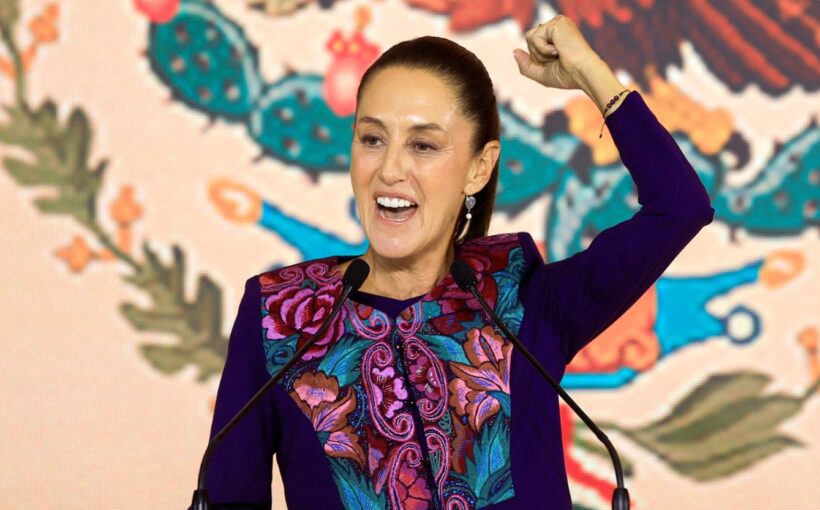Andrés Manuel López Obrador (more commonly known by his initials, Amlo) will step down from Mexico’s presidency on September 30, making way for his protégée and the country’s first female president, Claudia Sheinbaum Pardo.
Considered a “messianic” leader by some, the nation’s grandpa by others, and “a danger for Mexico” by his detractors, Amlo is a truly polarising figure. Nevertheless, his standout legacy may be more visual than political.
Amlo is a recurring star of documentary cinema and a leading YouTuber, surpassing even Donald Trump by number of subscribers. So, despite his insistence that he will “retire completely from politics” when his term ends, fears remain that his outsized representation will overshadow Sheinbaum’s government.
Several documentaries were made about Amlo following the first of his three presidential campaigns. The most popular of which, Luis Mandoki’s Fraude: México 2006, broke box office records for the genre.
The film sought to evidence the alleged electoral fraud that drove Amlo to declare himself Mexico’s legitimate president in 2006, sparking months of protests by Amlo supporters in the capital’s main square.
And while his unsuccessful 2012 bid for the presidency passed relatively quietly, Amlo leveraged the full power of his image to found a new political party, Morena, in 2014. His presidential campaign in 2018 dominated the online conversation, using platforms like Facebook, Instagram and YouTube.
Morena swept the elections in a shock upset, and Amlo thanked “the blessed social networks” in his first public address as president elect.
It didn’t stop there. Since taking office, he has held daily televised morning press conferences known as mañaneras. These are two-to-three hour sessions that start at 7am every weekday and are broadcast live on TV, as well as via the YouTube channels of Amlo, the government, and a number of national news outlets. By the end of his presidency, he will have recorded more than 1,500 mañaneras, equating to well over 3,000 hours of footage.
Despite the dull content of these videos – mainly him talking uncomfortably slowly, answering journalists’ questions ambiguously, and criticising his opposition and the media – Amlo’s YouTube account has amassed 4.5 million subscribers, outpacing the 3.2 million of Trump.
Nine months before the end of his term, Amlo opened a TikTok account, while his social media following continues to grow just days before he retires.
Amlo’s use of visual and social media has marked significant milestones in his career. But it also reflects a wider trend, particularly among populist politicians, of looking to bypass mainstream media and reach a larger audience.
Jair Bolsonaro in Brazil, Nicolás Maduro in Venezuela, and El Salvador’s self-entitled “coolest dictator”, Nayib Bukele, are among the leaders in Latin America who have had success in winning over or distracting the public with their content on platforms such as Instagram and TikTok.
The worrying far-right gains in Europe are also increasingly being linked to adept social media practices that successfully target youth voters – for instance, by National Rally party leader Jordan Bardella in France, or the Alternative for Germany party.
With mainstream parties often lagging in take-up or effective use of these platforms, there’s work to do to encourage greater media literacy among audiences and connect with citizens.
A Sheinbaum future
Amlo’s onscreen success could complicate his successor’s efforts to carve out her own identity. Sheinbaum’s image has long been linked to that of her mentor, and her career has closely mirrored his.
She was appointed to Amlo’s cabinet in 2000, and later elected to his former role as head of government in Mexico City in 2018. Amlo’s endorsement buoyed her presidential campaign, and she regularly appears in social media posts and public addresses with him.
Arguably most emblematic of this relationship is the cover to his latest political book, ¡Gracias!, where she is featured behind him, half-obscured by shadow.
When Sheinbaum was selected as Morena’s presidential candidate for the 2024 elections, critics warned about her lack of charisma. But she took to the spotlight, distancing her platform from Amlo with a focus on data and clean energy, while still embracing the so-called Fourth Transformation – Amlo’s promise to end corruption and impunity in Mexico.
Sheinbaum was elected with a record-breaking majority (59.75%). And her TikTok account has double the number of Amlo’s followers, as well as much more engaging content.
Amlo has played a significant role in Sheinbaum’s career, and his absence will leave a massive visual void. But if he can stay out of the limelight long enough, Sheinbaum has every chance to make her own mark on Mexico.
![]()
Jessica Wax-Edwards is a Marie Skłodowska-Curie Action Post-Doctoral Fellow at the University College Cork. Her project POPAMLO, which is funded by the European Union, examines the visual performance of populism with a focus on Andrés Manuel López Obrador.



